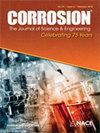Molecular origin of the CO2 enhanced water wetting during corrosion of an oil layer-attached steel surface in water flows
IF 1.3
4区 材料科学
Q4 MATERIALS SCIENCE, MULTIDISCIPLINARY
引用次数: 0
Abstract
Abstract To understand the role of CO2 in multiphase flow corrosion, the durability of an oil layer attached on steel surface against fluid flows was systematically evaluated. It confirms that CO2 can destabilize the protective oil layer and initiate electrochemical corrosion through the oil layer, showing a solution chemistry governed by flow dependency. The CO2 induced oil layer rupture was attributed to the water droplet actions at the oil/water interface and the steel surface, where the generation of micro-droplets were facilitated by the interactions between the dissolved CO2 and the oil molecules. It gives new insights into the replacement of oil layer by water in CO2 containing multiphase fluids, which benefits many application fields, such as corrosion and lubrication in oil-water mixed environments.在水流中,CO2分子源增强了油层附着钢表面腐蚀过程中的水润湿
摘要为了了解CO2在多相流腐蚀中的作用,系统地评价了附着在钢表面的油层对流体流动的耐久性。这证实了CO2会破坏保护油层的稳定,并通过油层引发电化学腐蚀,显示出一种受流动依赖控制的溶液化学。CO2诱导油层破裂的原因是油水界面和钢表面的水滴作用,其中溶解的CO2与油分子之间的相互作用促进了微液滴的产生。它对含CO2多相流体中油层被水取代的问题提供了新的见解,这有利于许多应用领域,例如油水混合环境中的腐蚀和润滑。
本文章由计算机程序翻译,如有差异,请以英文原文为准。
求助全文
约1分钟内获得全文
求助全文
来源期刊

Corrosion
MATERIALS SCIENCE, MULTIDISCIPLINARY-METALLURGY & METALLURGICAL ENGINEERING
CiteScore
2.80
自引率
12.50%
发文量
97
审稿时长
3 months
期刊介绍:
CORROSION is the premier research journal featuring peer-reviewed technical articles from the world’s top researchers and provides a permanent record of progress in the science and technology of corrosion prevention and control. The scope of the journal includes the latest developments in areas of corrosion metallurgy, mechanisms, predictors, cracking (sulfide stress, stress corrosion, hydrogen-induced), passivation, and CO2 corrosion.
70+ years and over 7,100 peer-reviewed articles with advances in corrosion science and engineering have been published in CORROSION. The journal publishes seven article types – original articles, invited critical reviews, technical notes, corrosion communications fast-tracked for rapid publication, special research topic issues, research letters of yearly annual conference student poster sessions, and scientific investigations of field corrosion processes. CORROSION, the Journal of Science and Engineering, serves as an important communication platform for academics, researchers, technical libraries, and universities.
Articles considered for CORROSION should have significant permanent value and should accomplish at least one of the following objectives:
• Contribute awareness of corrosion phenomena,
• Advance understanding of fundamental process, and/or
• Further the knowledge of techniques and practices used to reduce corrosion.
 求助内容:
求助内容: 应助结果提醒方式:
应助结果提醒方式:


